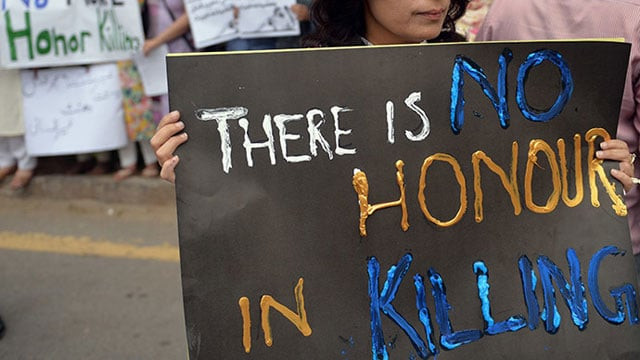Analysis: Honour crimes and the state
In-depth studies of crimes against women trace its roots to a patriarchal mindset

In-depth studies of crimes against women trace its roots to a patriarchal mindset. PHOTO: AFP
Abbottabad jirga ordered teenage girl be ‘set ablaze for helping friend elope’
In-depth studies of crimes against women trace its roots to a patriarchal mindset that seeks to exert control over women’s minds, bodies and choices, and a social structure that facilitates the execution of such a control, even if it requires employment of violent means. The state’s role in addressing such crimes by way of laws and an enforcement structure committed to bringing culprits to justice is of course a very relevant part of the equation. Pakistani rights bodies and human rights advocates, in addition to conscientious members of the parliament, mostly led by women, have tirelessly struggled to address the lacunas in laws that allow perpetrators of honour crimes a free way. Even police and the judiciary seem to have become increasingly aware of their respective institutions’ important roles in addressing honour crimes. It has been noted with much relief that in the recent Sumera case in Karachi, police have made themselves a complainant to prevent this crime from falling prey to the loopholes of the Criminal Code 2005 (meant to address honour killings).
There is no doubt a stronger set of laws and law enforcement targeted against honour crimes can do much to put a stop to such acts. However, the question that needs to be asked is: Does the state’s role finish at stronger legislation, an efficient police cadre and an aware and empowered judiciary? How effectively can these elements work in the presence of a system, unfortunately supervised by this very state that silently encourages suppression of the weak, sanctions violence and pursues institutionalised discrimination against women?
A matter of ‘honour’: Young man remanded into police custody for killing sister
In any society, state is the most powerful contributor to the foundations of societal relations, and so is its role in regulating them and addressing gaps that foster inequalities and marginalisation. However, by way of its actions and inactions, Pakistani state is forever in the process of creating more dispossession and marginalisation, whether by withdrawing from essential public services, such as access to healthcare, education, housing and law and order, or by systematic exclusion of religious, ethnic and gender minorities from the sphere of rights and entitlements. It therefore becomes acceptable in mainstream discourse that it is the fate of minorities to stay confined to the low strata of society or for the poor to die of inaccessibility to healthcare or for rural children to remain uneducated. No constitutional provisions or budgetary expenditures are to provide a counter argument.
Tribal 'jirga' in spotlight after brutal 'honour killing'
State’s sanctioning of violence is most profound in the ways violence is executed by police and security personnel, whether it relates to the casual thrashing of the accused or custodial torture, encounter killings and enforced disappearances. The brute use of force in land eviction or anti-encroachment operations is an indication of the state’s preference for high handedness rather than peaceful means of dialogue and engagement to establish the so-called order. Moreover, the unaccountability of security personnel in military and police operations across many parts of Pakistan does not help the cause of a positive image of the state.
General Zia’s Islamisation campaign is given credit for institutionalising discrimination against women by appointing the state as a direct regulator of their behaviour, conduct and image. Apart from discriminatory laws of Hudood Ordinance, Qisas and Diyat, and the Law of Evidence, among others, Zia’s drive to impose pardah, segregation and systematic exclusion of women from the public sphere all sought to make women invisible. It took post-Zia parliaments years of struggles to do away with discriminatory clauses and introduce laws that penalise rights infringement of women. However, these amendments are not matched by institutional efforts on the ground to realise them. To top this, state’s refusal to implement measures for recognition of women’s work and mainstreaming their participation in the economy continues to act as a powerful signal of its bias against women.
HRCP slams woman’s ‘brutal’ murder in Abbottabad
It is difficult to assume that for those who execute violence – especially in a brutal manner as is common in honour crimes – that fear of punishment alone can act as a deterrent. This is evident in the refusal of expression of shame by many culprits arrested over the crime. It is plausible to imagine the positive role of the references, especially those flowing from the state, that make violence and suppression an acceptable practice. It is only natural for this trend to be replicated in private life, whether on the pretext of shame or honour, against a section of the population whose ownership belongs to the society/community and whose voice officially stands as secondary. It is therefore advisable for rights advocates to target the entire societal code that acts against women, as a means to address honour crimes. Till the state officially accepts women as free, equal and respected citizens, it cannot expect society to act in a different manner, especially since society draws its references from this very state.



















COMMENTS
Comments are moderated and generally will be posted if they are on-topic and not abusive.
For more information, please see our Comments FAQ